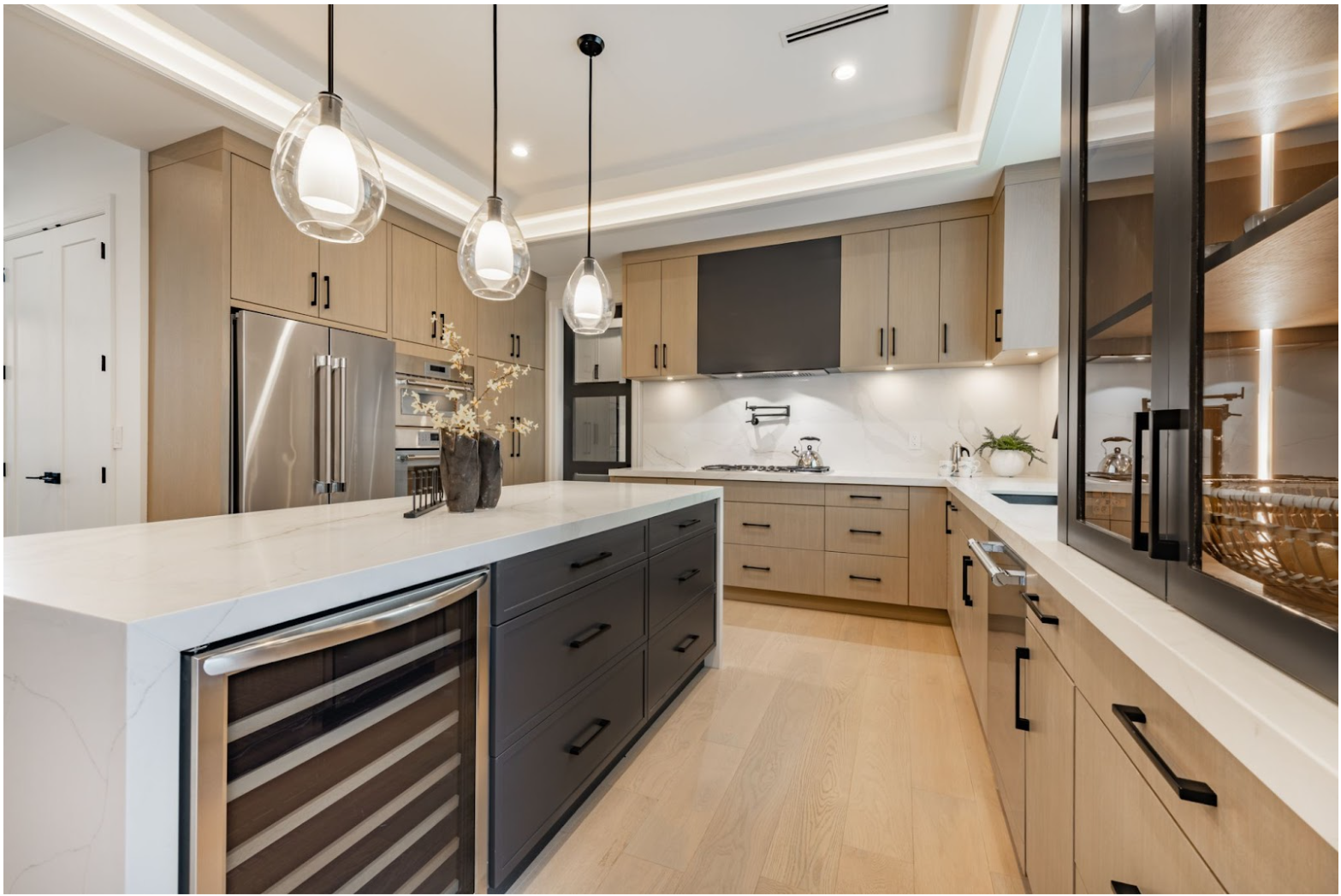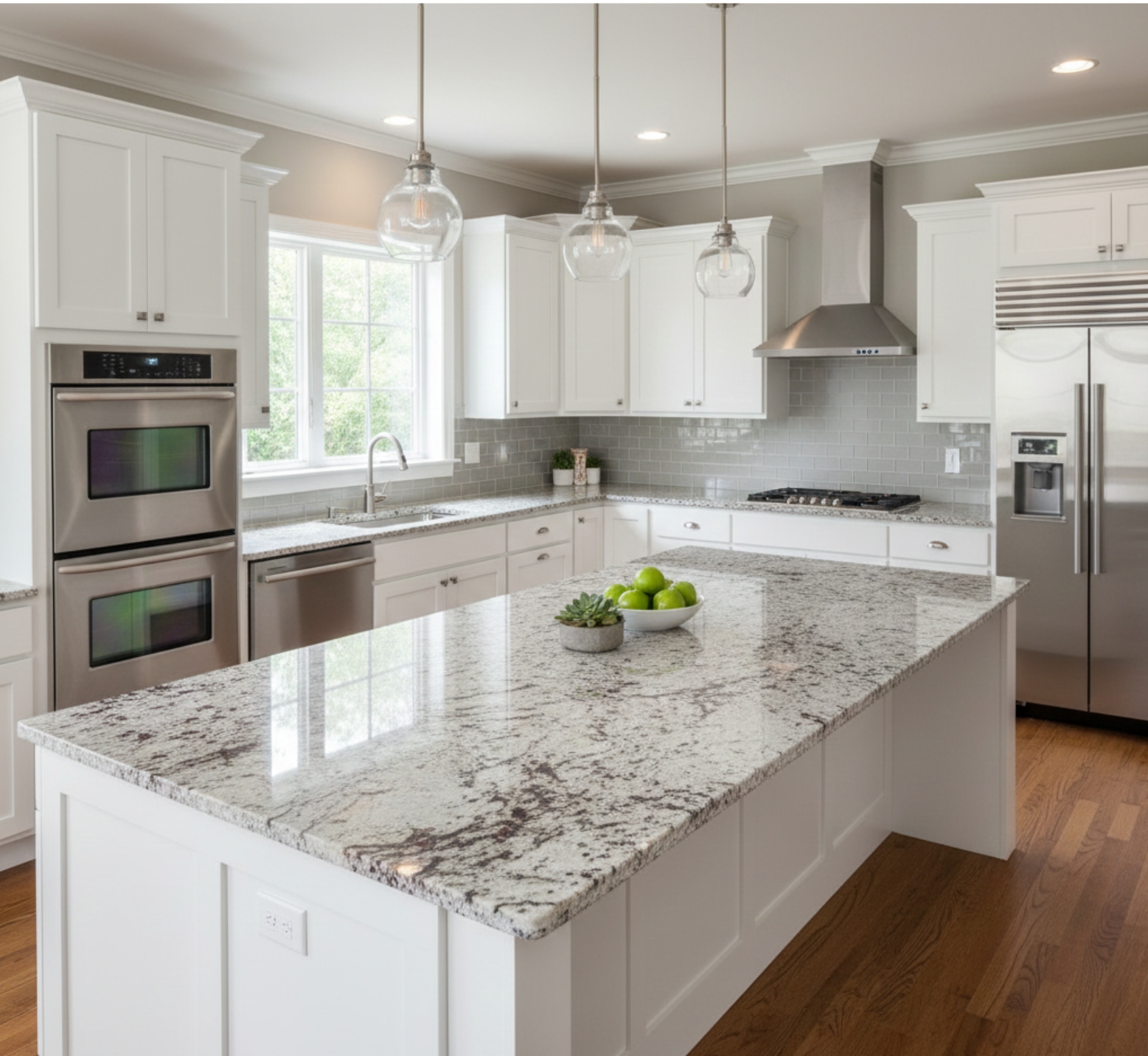The hardness of countertop materials is an important consideration when selecting countertops. Learn what hardness means and how each material measures up.

When selecting countertops for your kitchen or bathroom, durability ranks among the most important considerations. Your countertops face daily challenges from cutting knives, hot cookware, spills, and general wear. Understanding the varying hardness of countertop materials helps you make an informed choice that balances beauty, functionality, and longevity.
Hardness measures a material's resistance to scratches and surface abrasion. In practical terms, harder countertop materials better withstand kitchen knives, cookware, and everyday use without showing visible damage. This quality directly impacts both the appearance and lifespan of your investment.
While the hardness of countertop materials is crucial, it works alongside other properties like porosity and heat resistance to determine overall countertop performance. A comprehensive understanding helps you weigh trade-offs between different materials.
Developed in 1812 by German mineralogist Friedrich Mohs, the Mohs Hardness Scale provides the industry standard for measuring scratch resistance. The scale ranks materials from 1 (softest) to 10 (hardest), using ten reference minerals:
The scale works through comparative testing: if one material can scratch another, it receives a higher hardness rating. For reference, a fingernail rates about 2.5, a copper penny 3.5, and a steel knife blade approximately 5.5 on the Mohs scale.
Granite typically rates between 6 and 7 on the Mohs scale, making it highly scratch-resistant for daily kitchen use. This natural stone consists primarily of quartz, feldspar, and mica, with the exact mineral composition affecting hardness within the range. High-quality granite slabs often achieve harder ratings than lower-grade materials.
The variation in granite hardness means some slabs perform better than others under identical conditions. When selecting granite, ask your supplier about the specific hardness rating of your chosen slab.
True quartzite often surpasses granite in hardness, frequently rating 7 or higher on the Mohs scale. This metamorphic rock forms when sandstone undergoes intense heat and pressure, creating an exceptionally durable surface. Quartzite offers natural stone beauty with superior scratch resistance, making it ideal for heavy-use kitchens.
Marble presents a softer option at 3 to 4 on the Mohs scale. While stunning in appearance, marble scratches more easily than harder stones and requires careful maintenance. Marble countertops benefit from protective measures like cutting boards and prompt spill cleanup to preserve their elegant appearance.
Soapstone rates among the softer natural stones at 2.5 to 3 on the Mohs scale. While it scratches relatively easily, many homeowners appreciate how these marks create a lived-in patina over time. Light scratches can be sanded out, and the stone develops character with age.
Both limestone and travertine fall into the 3 to 4 Mohs range, similar to marble. These stones require careful handling and regular maintenance to prevent scratching and etching from acidic substances.
Engineered quartz countertops, composed of roughly 90% ground quartz mineral bound with resins and pigments, rate approximately 7 on the Mohs scale. This consistency in hardness, combined with non-porous properties, makes quartz an excellent choice for busy kitchens requiring minimal maintenance.
Large-format porcelain slabs achieve hardness ratings around 7 on the Mohs scale through high-temperature firing processes. These engineered surfaces resist scratches, heat, and UV damage while offering diverse design options.
Materials like Corian rate between 2 and 3 on the Mohs scale, making them more susceptible to scratching than stone options. However, scratches can often be buffed out through professional refinishing, extending the material's lifespan.
Concrete countertop hardness varies significantly based on mix composition and sealers used. Basic concrete rates around 5 on the Mohs scale, while specialized aggregates and treatments can push ratings higher.
Glass countertops rate approximately 5.5 on the Mohs scale. While resistant to most scratching, they can chip or crack under impact, requiring careful use.
While hardness measures scratch resistance, density indicates how tightly packed a material's molecules are. Higher density typically means lower porosity, reducing stain absorption and bacterial growth. The best countertop materials combine both high hardness and high density for optimal performance.
Dense materials also tend to be more durable over time, resisting wear patterns and maintaining their appearance longer. When evaluating countertops, consider both properties together rather than focusing solely on hardness.
If you frequently prepare meals, entertain guests, or have an active family, prioritize materials rating 6 or higher on the Mohs scale. Granite, quartzite, and engineered quartz offer the best combination of durability and aesthetics for demanding environments.
For guest bathrooms, wet bars, or occasional-use kitchens, softer materials like marble or soapstone may work well. These spaces typically see less wear, allowing you to prioritize aesthetics over maximum durability.
Consider your willingness to perform regular maintenance. Softer materials often require more frequent sealing, careful cleaning, and periodic refinishing. Harder materials generally need less ongoing care but may cost more initially.
Regardless of hardness rating, certain practices protect all countertop materials:
Hardness of countertop materials represents just one factor in countertop selection, but it is often an important one for homeowners. When selecting countertop materials, a holistic evaluation, including scratch resistance, appearance, cost, maintenance requirements, and heat resistance, is crucial. The ideal choice depends on your specific needs, lifestyle, and preferences.
At AP Marble & Granite, we help customers understand these technical aspects while finding materials that suit their practical needs and design vision. Our experienced team can explain how different hardness ratings translate to real-world performance in your specific application.
Schedule a consultation to view our vast selection of countertop materials in person.

Kitchen design continues to evolve, and 2026 is shaping up to be a year where warmth, texture, and contrast take center stage. Cabinet styles are moving away from stark minimalism and toward more character-driven designs. Understanding how cabinetry trends influence countertop selection helps create kitchens that feel current and cohesive.

Are you trying to decide between granite or quartz countertops for rentals in Metro Detroit? We compared the two in terms of value, durability, and maintenance.